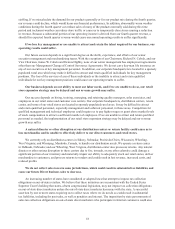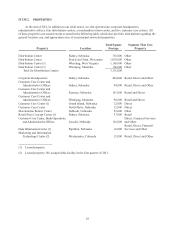Cabela's 2012 Annual Report Download - page 28
Download and view the complete annual report
Please find page 28 of the 2012 Cabela's annual report below. You can navigate through the pages in the report by either clicking on the pages listed below, or by using the keyword search tool below to find specific information within the annual report.18
staffing. If we miscalculate the demand for our products generally or for our product mix during the fourth quarter,
our revenue could decline, which would harm our financial performance. In addition, abnormally warm weather
conditions during the fourth quarter can reduce sales of many of the products normally sold during this time
period and inclement weather can reduce store traffic or cause us to temporarily close stores causing a reduction
in revenue. Because a substantial portion of our operating income is derived from our fourth quarter revenue, a
shortfall in expected fourth quarter revenue would cause our annual operating results to suffer significantly.
If we lose key management or are unable to attract and retain the talent required for our business, our
operating results could suffer.
Our future success depends to a significant degree on the skills, experience, and efforts of our senior
executive management and merchandising teams. With the exception of our Chairman, Richard N. Cabela, and our
Vice Chairmen, James W. Cabela and Dennis Highby, none of our senior management has employment agreements
other than our Management Change of Control Severance Agreements. We do not carry key-man life insurance on
any of our executives or key management personnel. In addition, our corporate headquarters is located in a sparsely
populated rural area which may make it difficult to attract and retain qualified individuals for key management
positions. The loss of the services of any of these individuals or the inability to attract and retain qualified
individuals for our key management positions could cause our operating results to suffer.
Our business depends on our ability to meet our labor needs, and if we are unable to do so, our retail
store expansion strategy may be delayed and our revenue growth may suffer.
Our success depends on hiring, training, managing, and retaining quality managers, sales associates, and
employees in our retail stores and customer care centers. Our corporate headquarters, distribution centers, return
center, and some of our retail stores are located in sparsely populated rural areas. It may be difficult to attract
and retain qualified personnel, especially management and technical personnel, in these areas. Competition for
qualified management and technical employees could require us to pay higher wages or grant above market levels
of stock compensation to attract a sufficient number of employees. If we are unable to attract and retain qualified
personnel as needed, the implementation of our retail store expansion strategy may be delayed and our revenue
growth may suffer.
A natural disaster or other disruption at our distribution centers or return facility could cause us to
lose merchandise and be unable to effectively deliver to our direct customers and retail stores.
We currently rely on distribution centers in Sidney, Nebraska; Prairie du Chien, Wisconsin; Wheeling,
West Virginia; and Winnipeg, Manitoba, Canada, to handle our distribution needs. We operate a return center
in Oshkosh, Nebraska; and our Wheeling, West Virginia, distribution center also processes returns. Any natural
disaster or other serious disruption to these centers due to fire, tornado, or any other calamity could damage a
significant portion of our inventory and materially impair our ability to adequately stock our retail stores, deliver
merchandise to customers, and process returns to vendors and could result in lost revenue, increased costs, and
reduced profits.
We do not collect sales taxes in some jurisdictions, which could result in substantial tax liabilities and
cause our future Direct business sales to decrease.
An increasing number of states have considered or adopted laws that attempt to impose tax collection
obligations on out-of-state retailers. We believe that these initiatives are inconsistent with the United States
Supreme Court’s holding that states, absent congressional legislation, may not impose tax collection obligations
on out-of-state direct marketers unless the out-of-state direct marketer has nexus with the state. A successful
assertion by one or more states requiring us to collect taxes where we do not do so could result in substantial
tax liabilities, including for past sales, as well as penalties and interest. The imposition by state governments of
sales tax collection obligations on out-of-state direct marketers who participate in Internet commerce could also
























